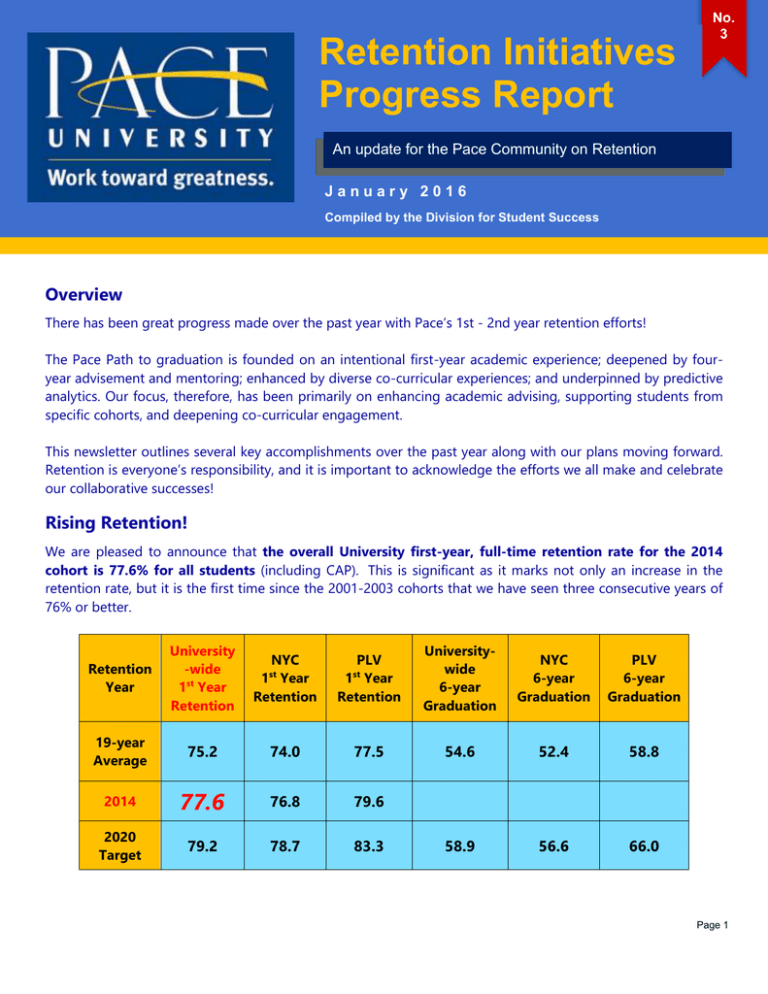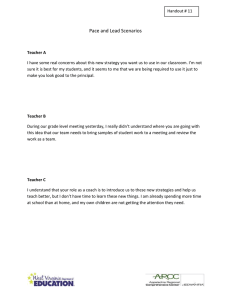Final Retention Progress Report - Third Edition
advertisement

Retention Initiatives Progress Report No. 3 An update for the Pace Community on Retention January 2016 Compiled by the Division for Student Success Overview There has been great progress made over the past year with Pace’s 1st - 2nd year retention efforts! The Pace Path to graduation is founded on an intentional first-year academic experience; deepened by fouryear advisement and mentoring; enhanced by diverse co-curricular experiences; and underpinned by predictive analytics. Our focus, therefore, has been primarily on enhancing academic advising, supporting students from specific cohorts, and deepening co-curricular engagement. This newsletter outlines several key accomplishments over the past year along with our plans moving forward. Retention is everyone’s responsibility, and it is important to acknowledge the efforts we all make and celebrate our collaborative successes! Rising Retention! We are pleased to announce that the overall University first-year, full-time retention rate for the 2014 cohort is 77.6% for all students (including CAP). This is significant as it marks not only an increase in the retention rate, but it is the first time since the 2001-2003 cohorts that we have seen three consecutive years of 76% or better. Retention Year University -wide 1st Year Retention NYC st 1 Year Retention PLV st 1 Year Retention Universitywide 6-year Graduation NYC 6-year Graduation PLV 6-year Graduation 19-year Average 75.2 74.0 77.5 54.6 52.4 58.8 2014 77.6 76.8 79.6 2020 Target 79.2 78.7 83.3 58.9 56.6 66.0 Page 1 UNV 101 and Advising UNV 101 Changes: Based on the university-wide UNV 101 review led by the UNV 101 Faculty Advisory Boards during fall 2015, the following changes will take effect beginning fall 2016: (1) UNV 101 will be shortened to 13 weeks for the semester and each class will be reduced to 1 ½ hours; (2) more full-time faculty will be sought to teach the course; and (3) two different tracks will be offered for faculty and staff teaching UNV 101, one which includes year-long advising and one which includes only teaching UNV 101 (with the professional Advisors handling the course registration piece). It is our hope that these changes will result in more full-time faculty interest in teaching the course and engaging first-year students early on. The content of UNV 101 remains the same. Advising Review, Plans, and Progress: A comprehensive advising review was undertaken over the summer and fall of 2015 which resulted in a number of recommendations. Moving forward, we will focus on: (1) addressing long-standing and systemic issues that make life complicated for students and advisors; (2) utilizing predictive analytics to enable better targeting of interventions for students in need; and (3) increasing our use of student success platforms to enhance the advising experience. The advising review also highlighted the many accomplishments over the past year, including the following: Pace is hiring 4 new professional Advisors on the NYC campus (2 in Lubin, 2 in Dyson) to ensure more appropriate Advisor-student ratios for student retention and success and to help students navigate the Pace Path. Implementation of Degree Works has helped students monitor their academic progress toward graduation. Great strides have been made in providing proactive, holistic, comprehensive advising for first-year students. This is evidenced by this past year’s National Survey on Student Engagement (NSSE) results, which revealed that Pace consistently achieved a higher positive mean score for advising than our peer institutions on all questions for first-year students. Registration holds are now placed on all first-year students to help ensure registration advisement. All first and second-year students are formally assigned to Academic Advisors, whose names are uploaded into Banner for display on the Portal and Degree Works. This will help to ensure that students know who their Advisor is. The first annual, university-wide Advising Month was developed to help ensure that students schedule their advising appointments early and are as prepared for registration as possible. Student Support Increased Use of Academic Progress System: In fall 2015, as a result of robust outreach and communication, a record 81% of faculty submitted academic alerts, which is an increase from 75% last year and an average of 40% previously. Alerts were used by Advisors in conjunction with a dashboard (highlighting key data for each student) to reach out to these students and provide the necessary support. We hope to increase this number even further with a new academic alert system, which is part of our Student Success and Retention platform, Starfish. Student Support Services (SSS) Grant Program: Thanks to Dr. Maria Iacullo-Bird, Assistant Dean in Dyson College, last semester Pace secured a million dollar grant from the U.S. Dept. of Education federal TRIO program, which enables us to serve up to 160 first and second-year students on the NYC campus. In recognition of the importance of non-cognitive factors in college student retention and Page 2 timely graduation, the grant will deploy both student peer mentors and graduate student coaches who will provide a broad array of services related to academic, financial, career and personal support for participants. These support teams will provide one-on-one and small-group mentoring, tutoring and discussion sessions. Leadership, Engagement and Action Program (LEAP): A second program for first-year students on the NYC campus was rolled out by the Division for Student Success (in collaboration with Student Development and Campus Activities and the Office for Housing and Residential Life) in the fall 2015 semester. This program offers group workshops and individual mentoring sessions with team leaders to effectively support the engagement, cocurricular involvement, personal growth, and ultimately retention of students from selected cohorts. CAP-Embedded Tutoring: In Fall 2014, CAP-NY initiated a pilot to provide additional academic support for its students who were taking English 110. Two sections had embedded writing tutors who attended classes and then met with their students weekly in the Writing Center for additional support for the entire semester. Higher grades and retention rates, along with a lower percentage of participating students being put on probation, led CAP to expand the embedded tutor pilot to all CAP English 110 sections for both semesters of the 2015-2016 academic year. Tutoring Center: For the 2014-15 academic year the NYC Tutoring Center saw a 7.6% increase in visits for a total of 9,991 and a 14% increase in individual student use for a total of 1,848 students. Much of this growth is attributable to the review program which is being continued and expanded. In addition, the Accelerated CAP Math Program was continued, which offers students who place into Math 100 on their Math Placement Exam the opportunity to take accelerated versions of Math 100 and 103 as Term A and B courses. The percentage of students moving onto Math 104 in the spring grew to 80% in fall 2015, an increase from 55% in fall 2014. For the 2014-15 academic year the PLV Tutoring Center saw a 48% increase in visits for a total of 14,850. Much of the growth is attributed to increased use by upperclass students who have made habituated usage of the Tutoring Center. Library: Foot traffic in the Birnbaum Library on the NYC campus increased by 23,377 in 2015 compared to 2014. In the Mortola Library on the PLV campus, building usage increased by 4,052 in the fall 2015 semester compared to fall 2014. Both libraries offered extended hours during midterms and finals which were well utilized. This supports our university-wide initiative to create a “culture of study” by encouraging students to make robust use of the library’s resources and services. Pace Path 4-Year Plans and Mentoring: The Pace Path, now in its second year, is an innovative program unique to Pace University that helps each student become successful in college, career, and life. Students develop strengths in managing oneself, interpersonal relations, and organizational awareness through co-curricular activities within an academic program. This is accomplished through collaboration with Pace faculty, advisors, staff, coaches and mentors. In Fall 2015, approximately 95% of first-year students in completed their Pace Path Four Year Plans. Additionally, of the 35 students who participated in Page 3 the Mentoring Program, 32 (91.4%) completed the mentorship. Between 100-150 students will have participated in the Mentoring Program during this academic year. For more information on the Pace Path, go to: www.pace.edu/PacePath or contact Dr. Brian Evans: bevans@pace.edu. 4PD: In the spring 2016 semester, first-year students will have the opportunity to participate in the Pace Path Personal and Professional Development (4PD) series, which is an interactive workshop series that develops Pace Path learning goals. The 4PD workshops are led by Pace faculty, staff, and alumni, and the presenter provides an interactive session while giving students valuable information aligned to the Pace Path. Students who wish to earn a certificate of completion must attend a minimum of five one-hour workshops on topics aligned to the Pace Path learning goals and complete a reflective essay at the end of the spring semester that addresses the actionable steps students will take to achieve their goals. Examples of 4PD sessions include critical/reflective thinking, communication, organizational culture, financial literacy, healthy living, travel abroad opportunities, reducing mathematics anxiety, and information technology. There will be a total of about 51 workshops between the two campuses. For more information on 4PD, go to: www.pace.edu/4PD. Early Pace Path Summer Support: Pace is planning for a 3-pronged initiative beginning in the summer of 2016 to provide - free of charge - several cohorts of entering first-year students with an opportunity to get a jump-start on their Pace Path to success: 1) a 6-week, summer bridge course (in person or online) for students in need of developmental mathematics; 2) a 5-day, early immersion program for 50 students from vulnerable populations (e.g., first generation, high financial need, and historically under-represented) focusing on such topics as non-cognitive skill building, academic expectations/planning, financial literacy, and college navigation; and 3) hiring several Financial Literacy Advisors who will meet with pre-identified, incoming students and their parents/guardians (those with high financial need) to help them prepare for, and understand the costs of a Pace education and their financing options. Co-curricular Experience First Year Interest Groups (FIGs): Pleasantville Residential Life and Housing has had the opportunity to implement a number of high-impact initiatives thanks to dedicated staff and new facilities over the last semester. The FIG program, designed to fully engage students through theme-based programs, has continued to grow. The fall semester saw 50 FIG programs, an increase of 18.78% in attendance, and a dedicated Faculty Partner for each of the 7 FIGs who work closely with FIG students. The first Faculty in Residence, Dr. Robert Mundy, has had an excellent success in programming, reaching over 75 students during various programs that allow them to enhance writing skills, connect with faculty, and even work towards publishing research. Satellite hours of the Writing Center in Alumni Hall were well-utilized. Shades: A Wo/men of Color Collective + Mentoring Program: The Shades Collective offers the spectrum of women of color and their allies an opportunity to network, meet likeminded peers, form friendships, be mentored, and have a resource to provide advocacy and referral as well as have a place to “talk,” whether it’s about academic or personal issues. Shades, which features a new name and logo (designed to be more inclusive of Pace’s trans students), currently has an active roster of 54 students who participate in the weekly discussion groups and workshops. For feedback or information on how you can participate in the implementation of the retention plan, please contact Sue Maxam: smaxam@pace.edu or Adèle MacKinlay: amackinlay@pace.edu. Page 4

